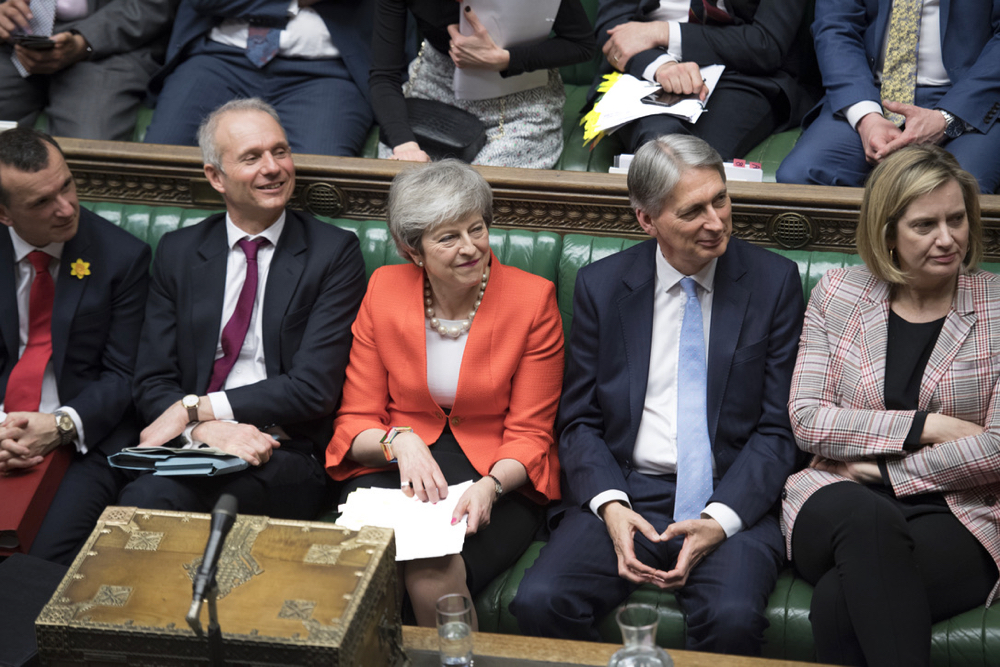Historians may record that this week in Westminster saw both a change in mood and a change in direction regarding Brexit. Some of the anger has dissipated, and so has some of the confusion. A clear course of events now lies ahead, with a pretty inevitable outcome: Brexit will have to be postponed. And that could become a step towards it being abandoned altogether. The odds are about even.
Theresa May was faced with a dilemma. She had at least three Cabinet ministers threatening to resign, and a score or more of junior ministers thinking of doing so as well, unless she changed direction. Her gamble was becoming too dangerous for them. Her calculation until this week had been that the prospect of Britain leaving the European Union without any sort of withdrawal arrangements in place – the so-called No Deal scenario – would be enough to frighten a sufficient number of MPs into voting for her draft agreement to give her a majority for it in the House of Commons.
But the No Deal scenario was becoming increasingly incredible simply because it was too catastrophic. The harm it would do to the nation’s economy would guarantee another bout of austerity, even more severe than the last one. Indeed factory closures, job losses, a flight of capital and cancellation of investment plans have already started. So a cross-party group of Parliamentarians hatched a plan to seize the steering wheel from the hands of the Prime Minister, to avoid a No Deal car crash. She avoided this loss of control by going along with it. It was a classic case of “if you can’t beat ‘em, join ‘em”.
Her swerve out of danger was a plan for a series of votes in the House of Commons on three consecutive days starting on March 12. The first would be on whether to accept her existing deal with the EU, plus any modifications. The last time the House of Commons was asked, her deal was thrown out by a margin of 230 votes. And any changes the EU can be persuaded to agree to, to make the deal more palatable to MPs, are unlikely to go far enough to do so. So she obviously realises she faces the possibility of another heavy defeat. Last time she had no plan B. Now she does, and this is what has changed the mood.
On the second day of the sequence, assuming she had been defeated on the first, she is proposing that MPs vote on the No Deal scenario, to accept or reject it. They have done so once already, so that outcome looks pretty predictable. And so on the third day, MPs will vote on whether to ask the remaining 27 members of the EU to grant the UK an extension of the leaving deadline, beyond the due date of March 29. By then, all other options having been exhausted, the outcome of that vote is also not hard to predict.
But here is the catch. All 27 will have to agree; every single one has a veto. And more than one of them is bound to ask – “A delay for what?” They will want some evidence that the UK position is no longer stuck in concrete, otherwise what is the point? At that moment Mrs May will have three options, none of which she will like. She can either shift her negotiating position, for instance proposing, as Labour has done, that the UK stays within the EU customs union; or she can dissolve Parliament and risk a general election; or she can pick up what has now also become Labour’s official policy, a “people’s vote”.
The outcome of what would in effect be a second referendum is as uncertain as the first in 2016. But there are three things to bear in mind. Immigration, which was a decisive issue in the first referendum, has somewhat faded from view as a source of grievance. Second, something like a million older voters who voted for Brexit in 2016 have since died; and another million young voters, very likely most of them pro-EU, have now joined the electoral register on reaching the age of 18. And third, the pro-Brexit campaign in 2016 made leaving the EU look very simple and easy. The last two years have proved otherwise.
My own sense is that, with the third anniversary of the 2016 referendum not far away, it is gradually becoming a stale memory. Some of those in favour of leaving the EU still speak of the result as a sacred covenant between politicians and people which must be honoured at all cost. But over three years, people change their minds about all sorts of things – moving house, changing jobs, marrying and divorcing, having kids. Ordinary people tend not to make promises that bind them that long. Insisting that a decision made three years ago cannot ever be reconsidered will at some point begin to look obsessional rather than rational. I think that point has almost arrived.
One other significant thing emerged in the course of the House of Commons debate on Wednesday. The leading protagonists were David Lidington, unofficially regarded as deputy prime minister, for the Government; and for Labour, Sir Keir Starmer, a new entry to Parliament who had previously served as Director of Public Prosecutions. Lidington has a PhD, and has held a variety of senior posts in government; Starmer, a QC, has six honorary doctorates. Both are Remainers. It is well known they have private conversations on the key issues facing the country.
On their feet in the House for about an hour each, they were fluent, intelligent, courteous and civilised, both masters of their briefs, incisive in their answers. Given that neither Theresa May nor Jeremy Corbyn enjoys much confidence in their own parties and in the country at large, it is not hard to see in this other pair interesting possibilities for the future of British politics. Neither of them has much baggage, nor many enemies. They are not the most charismatic of politicians, but both are capable of leading their parties – and the nation. What a change for the better that would be!
CLIFFORD LONGLEY'S BREXIT WATCH:
Clifford Longley will be writing regular updates on Brexit over the coming weeks. To read more click on the links below.
Dark days in Brexit land
If a 'no deal' Brexit is ruled out, what next?
Revocation of Brexit on the horizon?
Could Brexit now be abandoned altogether?
Did May fundamentally misunderstand the Brexit referendum result?



 Loading ...
Loading ...
What do you think?
You can post as a subscriber user ...
User comments (0)